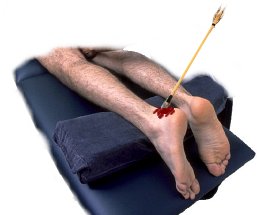Abdominal Pain
February 7, 2001
Each issue, Q Fever! presents a challenging clinical conundrum to test readers' problem-solving skills and illustrate bread-and-butter medical principles. Good luck!
The patient is a 32-year old Greek male who presents to the Emergency Department with the chief complaint of acute abdominal pain.
The pain, described as diffuse, began suddenly twelve hours prior, and has been increasing steadily since then. It is accompanied by severe nausea, with frequent vomiting and inability to tolerate oral intake.
Of note, in addition to his abdominal complaints, the patient also states he has a sore throat which feels "a little hoarse," and has a sharp pain in his right ankle which is worsening.
No previous such episodes are reported.
The patient denies past medical or surgical conditions, is on no medications, and has no known drug allergies.
Social history reveals that the patient is married, has two children, and does not smoke or drink alcohol.
On physical exam, the patient appears acutely ill, and is noted to have frequent episodes of retching.
There is an unusual "scratchiness" to the patient's voice.
Temperature is 101.1F, pulse is 120, blood pressure is 120/85, and respirations are 35.
Head and neck, lung, and heart exams are normal.
Abdominal exam is significant for diffuse tenderness and decreased bowel sounds, with mild guarding, and no rebound tenderness.
Close examination of the patient right ankle reveals the following:

What's going on?
Answer:
Homer's Ileus
This patient's signs and symptoms, which include vomiting, abdominal pain, and decreased bowel sounds, along with an arrow piercing the Achilles tendon, are highly suggestive of Homer's Ileus.
A raspy sore throat solidifies the diagnosis, and results in a distinctive vocal quality known as "the Trojan hoarse."
Homer's Ileus, a rare disorder occuring in less than 0.02% of Americans, is nevertheless fairly frequent in people of Mediterranean descent, and should always be suspected when abdominal pain, decreased bowel sounds, and an arrow piercing the Achilles tendon occurs in this group.
Treatment involves fluids, surgical consultation, and the construction of a large wooden fleet upon whose sturdy decks the mighty Acheaen army shall speed toward the Hellespont.
Successful resolution of the instestinal conflict is usually achieved within one to two weeks; recovering patients are encouraged to ride their chariots triumphantly around the Coliseum, dragging their vanquished enemies behind them.
More Stuff!
Get the Q Fever! Book!
The Q Fever! Store!: T-shirts, caps, mugs, and thongs!
Support The Q!
Subscribe to the Q Fever! Mailing List!
Contact Q Fever!
Remember: Quality Without The Q Is Just Uality!
Menu

